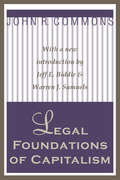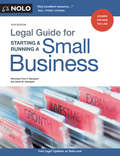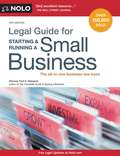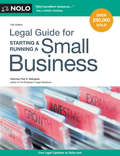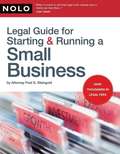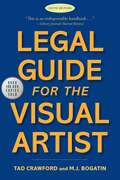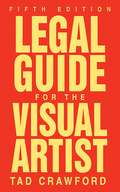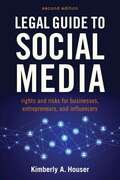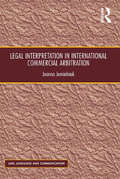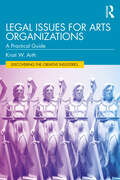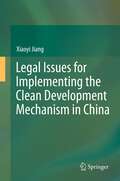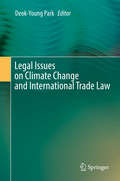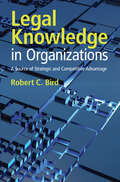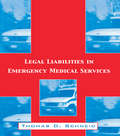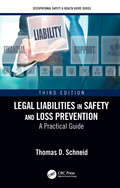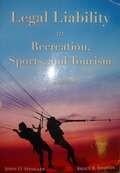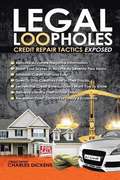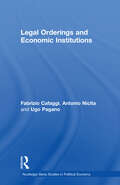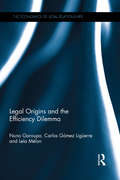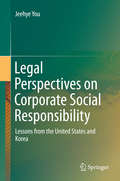- Table View
- List View
Legal Forms of Organization
by Michael J. RobertsDescribes the various legal forms of organization including proprietorships, partnerships, limited partnerships, corporations, and limited liability companies. Explains the tax and liability attributes of each form, as well as other issues, which may influence the choice of legal form.
Legal Foundations of Capitalism (Reprints Of Economic Classics Ser.)
by John R. CommonsIn what has universally been recognized as a classic of institutional economics, John R. Commons combined the skills of a professional economist, the sensibilities of an American historian, and the passion of an active participant in the conflicts of individuals, self-interest of groups, and function of voluntary associations.The aim of this volume is to work out an evolutionary and behavioral theory of value. In order to do so thoroughly, Commons examines the decisions of the courts. Doing so compelled an examination of what the courts mean by reasonable value. Commons found that the answer was tied up with a notion of reasonable conduct. It was Commons who carried the study of the habits and customs of social life to the next stage: the decisions of the courts that are based on custom and that profoundly impact the nature and function of the economic system as such.Reviewing Legal Foundations of Capitalism, Wesley Mitchell declared that Commons carried this "analysis further along his chosen line than any of his predecessors. Into our knowledge of capitalism he has incorporated a great body of new materials which no one else has used adequately." And writing in the same American Economic Review twenty-one years later, Selig Perlman noted that "To Commons the workingmen were not abstract building blocks out of which a favored deity called History was to shape the architecture of the new society, but concrete beings with legitimate ambitions for a higher standard of living and for more dignity in their lives." This edition is graced with a special introduction that places Commons in proper academic as well as intellectual context.
Legal Geographies of Water: The Spaces, Places and Narratives of Human-Water Relations (Earthscan Water Text)
by Cristy ClarkThis book deepens our understanding of humanity’s diverse relationships with water and the law, providing a critical assessment of this relationship, and charting the course towards a more sustainable and just water future.By using legal geography, this book pays particular attention to the place-based inter-relationships between water, people, and law (both formal and informal) and to the ways that law both constitutes and is constituted by the relationship between people and place. Starting in the 1980s, Chapter 2 investigates the early commodification of water through the liberalisation of rural water markets in Chile and the urban water supply and sanitation systems of England and Wales. Chapter 3 then examines the global expansion of neoliberal water governance in the 1990s, starting with donor-driven reforms in the global south and particularly Manila in the Philippines. Chapters 4 and 5 document both the grassroots response to these neoliberal water reforms and the inherent tensions in the attempts of the early 2000s to reconcile the recognition of a human right to water with the ongoing rollout of market mechanisms, both in the domestic context of South Africa and within the United Nations human rights system. Moving forward again, Chapter 6 examines the recent intensification of neoliberal water governance through financialisation and considers its specific impacts in Detroit and Flint, Michigan. Chapter 7 then considers the renewed global emphasis on living waters and Indigenous ontologies of water by examining the new legislative arrangements for the Whanganui River in Aotearoa, New Zealand. The book concludes in Chapter 8 by highlighting the stories of hope that can be found in many of the case studies explored in the book and in emerging examples from around the world.This book is essential reading for students and scholars interested in water law, security, and justice from across a wide range of disciplines, including environmental studies, law, geography, human rights, and political ecology.
Legal Guide for Starting & Running a Small Business
by Fred S. Steingold David SteingoldThe all-in-one business law book Whether you’re just starting a small business, or your business is already up and running, legal questions crop up on an almost daily basis. Ignoring them can threaten your enterprise—but hiring a lawyer to help with routine issues can devastate the bottom line. The Legal Guide for Starting & Running a Small Business has helped more than a quarter million entrepreneurs and business owners master the basics, including how to: raise start-up money decide between an LLC or other business structure save on business taxes get licenses and permits choose the right insurance negotiate contracts and leases avoid problems if you’re buying a franchise hire and manage employees and independent contractors attract and keep customers (and get paid on time), and limit your liability and protect your personal assets. The 16th edition is completely updated with the latest business tax rules and numbers, and best practices for classifying workers (as employee or independent contractor).
Legal Guide for Starting & Running a Small Business
by Fred S. SteingoldSmall business owners are regularly confronted by a bewildering array of legal questions and problems. Ignoring them can lead to disaster but with lawyers typically charging $200 $300 an hour, calling one to answer routine legal questions can be a fast track to the poorhouse. Fortunately, you have a better alternative. Legal Guide for Starting & Running a Small Business clearly explains the practical and legal information you need to: . raise start up money . choose between a sole proprietorship, partnership or LLC . get licenses and permits . buy or sell a business or franchise . negotiate a favorable lease . insure your business . hire independent contractors safely . understand small business tax rules . pick and protect a good name . resolve legal disputes . adopt the best customer policies . enter into strong contracts . cope with financial problems This edition is thoroughly updated, including the latest regulations, tax numbers, and business realities in a changing economy.
Legal Guide for Starting & Running a Small Business
by Fred S. SteingoldThe all-in-one business law book! When you run a small business, legal questions crop up almost on a daily basis. Ignoring them can threaten your enterprise—but hiring a lawyer to help with routine issues can devastate the bottom line. Fortunately, you have a better alternative. Legal Guide for Starting & Running a Small Business clearly explains how to: raise start-up money pick the right business structure get licenses and permits negotiate a favorable lease protect yourself with the right insurance create binding contracts hire, fire, and manage employees cope with financial problems protect your personal assets, and save on business taxes. The 15th edition is completely updated with the latest business tax rules and numbers, including options for members of husband and wife LLCs, rules for depreciating and expensing business assets, and best practices for classifying workers (as employee or independent contractor).
Legal Guide for Starting and Running a Small Business (10th edition)
by Fred SteingoldThis easy-to-understand book covers what small-business owners need to know, such as choosing a business structure, taxes and the IRS, employees and independent contractors, and much more.
Legal Guide for the Visual Artist
by Tad Crawford M. J. BogatinAn updated edition of the legal art classic. Legal Guide for the Visual Artist is a classic guide for artists. This sixth edition is completely revised and updated to provide an in-depth view of the legal issues facing the visual artist today and provides practical legal guidance for any visual artist involved with creative work. It has been over twelve years since the fifth edition was published, and so much has changed in the world since that time, especially in the law and artists&’ legal rights and obligations. This edition has been updated for both a new generation of visual artists and for those who have purchased earlier editions. Among the many new topics covered in this comprehensive guide are: copyright fair use transformative rights; recognition of the rights of temporal street art in the Five Pointz VARA case; the demise of California&’s Resale Royalty statute; NFTs; detailed coverage of the myriad developments in copyright (including online copyright registration procedures and use of art on the Internet); changes in laws protecting artists in artist-gallery relationships are explained in depth; scope of First Amendment protections for graffiti art and the sale of art in public spaces; detailed as well as new cases dealing with art and privacy; and a model contract for Web site design and much more. The book also covers copyrights, moral rights, contracts, licensing, sales, special risks and protections for art and artists, book publishing, video and multimedia works, leases, taxation, estate planning, museums, collecting, grants, and how to find the best professional advisers and attorneys. In addition, the book suggests basic strategies for negotiation, gives information to help with further action, contains many sample legal forms and contracts, and shows how to locate artists' groups and Volunteer Lawyers for the Arts organizations. Legal Guide for the Visual Artist is a must-have for any visual artist hoping to share, sell, display, or publish their art.
Legal Guide for the Visual Artist
by Tad CrawfordThis classic guide for artists is completely revised and updated to provide an in-depth view of the legal issues facing the visual artist today and provides practical legal guidance for any visual artist involved with creative work. Among the many new topics covered in this comprehensive guide are: detailed coverage of the myriad developments in copyright (including online copyright registration procedures and use of art on the Internet); changes in laws protecting artists in artist-gallery relationships are explained in depth; scope of First Amendment protections for graffiti art and the sale of art in public spaces; detailed as well as new cases dealing with art and privacy; and a model contract for Web site design and much more. The book also covers copyrights, moral rights, contracts, licensing, sales, special risks and protections for art and artists, book publishing, video and multimedia works, leases, taxation, estate planning, museums, collecting, grants, and how to find the best professional advisers and attorneys. In addition, the book suggests basic strategies for negotiation, gives information to help with further action, contains many sample legal forms and contracts, and shows how to locate artists' groups and Volunteer Lawyers for the Arts organizations.
Legal Guide to Social Media, Second Edition: Rights and Risks for Businesses, Entrepreneurs, and Influencers
by Kimberly A. HouserLearn how to navigate the ins and outs of the law and social media. How should you respond to a request to remove copyrighted materials from a Facebook page? If you create a Twitter username at work, who owns the username when you change jobs? Can you be sued for libel if someone thinks your posts are defamatory? If you&’ve ever asked yourself these kinds of questions, this pioneering legal handbook is for you. Despite the enormous growth in social media usage by businesses and influencers, very little has been written about the laws affecting their activities. In this new edition of the Legal Guide to Social Media, Kimberly A. Houser, law professor and tech attorney, explains the potential pitfalls and how to avoid them including what social media influencers could have done to protect themselves from the lawsuits resulting from the Fyre Festival debacle. Easy-to-understand, comprehensive, and up-to-date, the Legal Guide to Social Media, Second Edition provides the latest information on case law and statutes. It covers everything from privacy laws to the legal considerations in setting up a page or website as well as new governmental regulations. This plain English legal companion offers examples of and solutions to the kinds of situations you can expect to encounter when posting online content, whether for yourself, your own business, or on behalf of your client&’s business. You&’ll learn how to avoid liability for defamation and third-party posts, how to protect your own content, the unique legal issues surrounding social media in the workplace, and much, much more. The new edition covers new state regulations on privacy, data security and advertising; how to avoid intellectual property infringement actions; and the newer legal risks for influencers.
Legal Hazards of Product Launches
by Lena G. Goldberg Annelena LobbThis note considers common legal pitfalls associated with the launch of new products. A series of questions are presented that companies poised to launch a product should keep in mind. Questions about advertising, pricing, and branding are explored, as well as who in a product's supply chain might bear liability if the product is faulty.
Legal Hazards of Product Launches
by Lena G. Goldberg Annelena LobbThis note considers common legal pitfalls associated with the launch of new products. A series of questions are presented that companies poised to launch a product should keep in mind. Questions about advertising, pricing, and branding are explored, as well as who in a product's supply chain might bear liability if the product is faulty.
Legal Interpretation in International Commercial Arbitration (Law, Language and Communication)
by Joanna JemielniakThis book fills a gap in legal academic study and practice in International Commercial Arbitration (ICA) by offering an in-depth analysis on legal discourse and interpretation. Written by a specialist in international business law, arbitration and legal theory, it examines the discursive framework of arbitral proceedings, through an exploration of the unique status of arbitration as a legal and semiotic phenomenon. Historical and contemporary aspects of legal discourse and interpretation are considered, as well as developments in the field of discourse analysis in ICA. A section is devoted to institutional and structural determinants of legal discourse in ICA in which ad hoc and institutional forms are examined. The book also deals with functional aspects of legal interpretation in arbitral discourse, focusing on interpretative standards, methods and considerations in decision-making in ICA. The comparative examinations of existing legal framework and case law reflect the international nature of the subject and the book will be of value to both academic and professional readers.
Legal Issues for Arts Organizations: A Practical Guide (Discovering the Creative Industries)
by Kristi W. ArthLegal issues touch every aspect of organizations in the creative and cultural sectors. This book teaches non-lawyer, arts administration professionals and students how to identify and manage legal issues common to arts organizations.Legal Issues for Arts Organizations demystifies common legal problems and helps readers to approach them proactively. With an easy-to-remember “issue-spotting” process, the book helps develop the average administrator’s “eye” for legal issues, so that the administrator knows when to do more research and when to seek out professional legal assistance. Written by a law professor and former intellectual property litigator with experience in arts policy and administration, this book provides a framework that arts professionals can use to navigate legal issues with increased confidence. It provides an overview of the American legal system, teaches a systematic process for identifying legal issues, trains administrators to read and understand contracts, gives practical advice for working with professional lawyers, and puts theory into practice with an applied learning component.Packed with practical tips and advice, this book provides a primer that every arts administrator and every arts- and nonprofit-management student will find immediately useful.A book adoption gift containing teaching support materials is available to instructors. To gain access, visit www.routledge.com/9780367771133.
Legal Issues for Implementing the Clean Development Mechanism in China
by Xiaoyi JiangToday, climate change is among the most hotly-debated topics. The Clean Development Mechanism (CDM), one of the three financial mechanisms under the Kyoto Protocol open to developing and developed countries, was devised to assist in mitigation of global warming. This book discusses what China should do to make full use of the CDM to promote sustainable development and to meet the challenge of climate change from a legal perspective. The findings lead to the conclusion that the CDM has limitations in promoting sustainable development in China, and thus should be regarded only as a complementary instrument in combating climate change. Legal strategies for improving the implementation of CDM projects under the legal framework in China are thus put forward, and some proposals for China to meet the challenge of climate change in the post-2012 era are made. This book offers new insights to academics and policymakers both in the public and private sector. It is intended for legal practitioners and researchers on carbon trading as well as policymakers interested in the role of developing countries in climate change law. In addition, it is of interest to stakeholders of CDM projects.
Legal Issues on Climate Change and International Trade Law
by Deok-Young ParkThis book provides anexcellent overview of the legal issues surrounding climate change mitigationand international trade law. It surveys key observed and potential challengesposed by responses to climate change in terms of international trade law. By examiningthe controversial issues seen in legal cases in which domestic climate changeor renewable energy measures conflicted with international trade regimes, thisvolume promotes and broadens the understanding and debate of the issues. Beyondthe recognized challenges, this book uncovers potential areas of conflictbetween climate change responses and international trade promotion by exploringprevious cases and current efforts to prevent climate change. Furthermore, thisvolume sheds light on the future direction of international trade law andclimate change responses, pointing out that the development of climate changeor renewable energy laws and policies must also consider international traderegimes in order to ensure the smooth implementation of said laws and policiesand guarantee that international trade laws do not restrict environmentalpolicy space.
Legal Knowledge in Organizations: A Source of Strategic and Competitive Advantage
by Robert C. BirdThis work offers a step-by-step guide on how to utilize the law as a source of value in organizations. Robert C. Bird demonstrates how legal knowledge can be a valuable asset for firms, providing them with a sustainable competitive advantage that is difficult for rivals to imitate. Bird presents a five-part framework that outlines how firms can use legal knowledge in competitive markets and how they can avoid misusing it. Chapters also highlight how firms can cultivate legal knowledge and apply novel risk tools to overcome unexpected legal threats. The book emphasizes the importance of ethical values in business decisions and shows how managers and lawyers can build an ethical practice of legal knowledge that benefits both business and society. With the help of numerous visuals, this book makes it easy for readers to leverage legal knowledge and apply it to specific business contexts.
Legal Liabilities in Emergency Medical Services
by Thomas D. SchneidThis text is the first of its kind to address the various legal issues facing the emergency medical service. Readers will find a myriad of legal issues ranging from bloodborne pathogens to wage issues. Schneid offers not only insight into the applicable laws but also proactive approaches to avoid or minimize the risks of litigation. A must for every manager and administrator with emergency medical responsibilities.
Legal Liabilities in Safety and Loss Prevention: A Practical Guide, Third Edition (Occupational Safety & Health Guide Series)
by Thomas D. SchneidThe goal of every safety professional and safety program is to be proactive and to identify problems while complying within safety guidelines. This book clarifies basic questions about legal liability, how to minimize, prevent, and identify legal risks. Appendices, case studies, and sample forms are included in this resource. The whole book will be revised due to the laws and regulations in the workplace changing. This revised edition will address all of the changes in the laws as well as providing guidance on how to achieve and maintain compliance. Features Covers methods to achieve and maintain compliance Includes new standards and regulations Discusses defense, rights, and responsibilities Provides a guide to professionals who are unfamiliar with reviewing, analyzing, and briefing a court decision Offers a new chapter on environmental and labor
Legal Liability in Recreation, Sports, & Tourism
by John O. SpenglerThe subject of legal liability conjures up thoughts of high costs, fiscal devasta¬tion, difficult legal language, attorneys, myriad legal papers, and time-consuming litigation. People generally fear those things that they don’t understand. The major purpose of this book is to provide recreation and sports students, practitioners, and professionals in the field with a body of knowledge that will help them manage the legal risks that are an everyday part of their lives. In the past, the field of recreation appeared to be sacrosanct when it came to people wanting to sue for damages. Prior to 50 years ago, when lawsuits were filed, the courts considered leisure pursuits as frivolous, and therefore counter to the good of society. The social structure and so-called “Protestant ethic” of the time called for hard work, not recreation. Only the very rich were privileged to have “leisure time.” In the past decades, the average citizens opportunity for leisure has increased significantly, and so has the extent of recreation, sport, and tourism litigation. Times have indeed changed!
Legal Loopholes: Credit Repair Tactics Exposed
by Charles DickensIt is estimated that over 80 million Americans are living with poor credit, and recent studies have shown that up to 79% of all credit reports contain errors. Use this recession-proof, guerilla-repair guide to quickly and legally repair your credit and improve your scores. Don't pay credit repair companies thousands of dollars; do it yourself, and be fast on your way to owning the car or house of your dreams. Remove accurate negative information. Boost your scores in as little as 72 hours. Establish credit fast and easy. Laws to stop creditors fast in their tracks. Secrets the credit bureaus don't want you to know. Remedy identity theft in 4 days.
Legal Orderings and Economic Institutions
by Ugo Pagano Antonio Nicita Fabrizio CafaggiThis book addresses the lively interaction between the disciplines of law and economics. The traditional boundaries of these two disciplines have somehow inhibited a full understanding of the functioning of and the evolution of economic and legal systems. It has often been the case that these boundaries have had to be reshaped, and sometimes abolis
Legal Origins and the Efficiency Dilemma (The Economics of Legal Relationships)
by Nuno Garoupa Lela Mélon Carlos Gómez LigüerreEconomists advise that the law should seek efficiency. More recently, it has been suggested that common law systems are more conducive of economic growth than code-based civil law systems. This book argues that there is no theory to support such statements and provides evidence that rejects a 'one-size-fits-all' approach. Both common law and civil law systems are reviewed to debunk the relationship between the efficiency of the common law hypothesis and the alleged inferiority of codified law systems. Legal Origins and the Efficiency Dilemma has six aims: explaining the efficiency hypothesis of the common law since Posner’s 1973 book; summarizing the legal origins theory in the context of economic growth; debunking their relationship; discussing the meaning of 'common law' and the problems with the efficiency hypothesis by comparing laws across English speaking jurisdictions; illustrating the shortcomings of the legal origins theory with a comparative law and economics analysis; and concluding there is no theory and evidence to support the economic superiority of common law systems. Based on previous pieces by the authors, this book expands their work by including new areas of analysis (such as trusts), detailing previous analysis (such as French law versus common law in the areas of contract, property and torts), and updating for recent developments in the academic discourse. This volume is of interest to academics and students who study microeconomics, comparative law and foundations of law, as well as legal policy analysts.
Legal Perspectives on Corporate Social Responsibility
by Jeehye YouThis book offers readers a comprehensive and in-depth legal analysis of corporate social responsibility (CSR) by examining the theoretical foundations of corporate governance and its legal mechanism in the United States and South Korea. Moreover, it proposes legislative blueprint for establishing the legal frameworks that might serve to legitimize and effectively implement CSR in general. Reflecting the zeitgeist of improved corporate accountability and transparency, the ongoing movement to enhance CSR has permeated entire sectors of society the world over. Despite the apparent ubiquity of CSR, the corporate laws of many countries remain relatively silent on the issue, omitting to include any explicit provision governing the concept. Partly in response to this lack of legislation, Korean corporate scholars, for example, have attempted to introduce American legal theories, systems and laws on CSR into Korea. Yet traditional Korean jurisprudence provides no defining foundation for CSR; indeed, the prevailing view in jurisprudence and scholarship passively resists instituting corporate responsibility into the law. In response to this jurisprudential and academic shortcoming, and as an example for other countries, this book provides a comprehensive guide to the relevant legislation and theory on CSR in Korean corporate law by employing a comparative study of the relevant American theories and laws. Proceeding from this analysis, the book then puts forward a legislative blueprint for establishing a foundation to legitimize and effectively implement CSR.
Legal Plunder: Households and Debt Collection in Late Medieval Europe
by Daniel Lord SmailAs a Europe grew rich in the Middle Ages, the well-made clothes, linens, and wares of households often substituted for hard currency. Pawnbrokers kept goods in circulation, and sergeants of the law marched into debtors' homes to seize belongings equal in value to debts owed. David Smail describes a material world on the cusp of modern capitalism.

